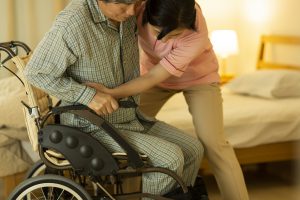Samaritan is a proud provider of Dementia Care and uniquely distinguished as a GUIDE provider by the Centers for Medicare and Medicaid (CMS). Click to learn more.
(856) 596-1600 available 24/7 Refer Now
 It started more than a decade ago. Angela, now 75, had recently retired from corporate law when her children noticed their mom shuffling her feet as she walked. She even had fallen while shopping at the mall and again while out to dinner another day. Angela shrugged it off as “accidents happen.” But then one day she fell and broke her nose. That’s when she decided it was time to see a doctor.
It started more than a decade ago. Angela, now 75, had recently retired from corporate law when her children noticed their mom shuffling her feet as she walked. She even had fallen while shopping at the mall and again while out to dinner another day. Angela shrugged it off as “accidents happen.” But then one day she fell and broke her nose. That’s when she decided it was time to see a doctor.
Right away, her primary care doctor noticed her fingers tremored during the visit. This small sign prompted the doctor to give Angela a referral to a neurologist. The neurologist confirmed: Angela had Parkinson’s disease.
Parkinson’s disease (PD) is a progressive neurological disorder that starts slowly and affects movement. During the earliest of the five stages, you may experience a mild tremor in your hands or fingers, muscle stiffness, stooped posture, the loss of automatic movements such as blinking, smiling, or swinging your arms as your walk, and/or some soft speech changes.
At each stage, the symptoms become more pronounced. However, end-stage Parkinson’s is considered stages four and, the last stage, five.
 Stage four for Parkinson’s disease is often called advanced Parkinson’s disease because people in this stage experience severe and incapacitating symptoms. This is when medication doesn’t help as much and serious disabilities set in.
Stage four for Parkinson’s disease is often called advanced Parkinson’s disease because people in this stage experience severe and incapacitating symptoms. This is when medication doesn’t help as much and serious disabilities set in.
There’s an increased severity in:
Many times someone with advanced PD can’t live on their own and needs help with daily tasks.
Stage five is the final stage of Parkinson’s, and assistance will be needed in all areas of daily life as motor skills are seriously impaired. You may:
As Parkinson’s disease (PD) progresses into these advanced stages, its symptoms can often become increasingly difficult to manage. Whether you or your loved one with end-stage Parkinson’s lives at home, in an assisted living facility or a nursing home, hospice services can optimize your quality of life and that of your family members as well.

 When you or your loved one have a life expectancy of six months or less, you become eligible for hospice care – a type of comfort care provided at the end of life for someone living with end-stage Parkinson’s disease. Hospice provides extra support so your loved one can live as comfortably as possible.
When you or your loved one have a life expectancy of six months or less, you become eligible for hospice care – a type of comfort care provided at the end of life for someone living with end-stage Parkinson’s disease. Hospice provides extra support so your loved one can live as comfortably as possible.
If you have experienced a significant decline in your ability to move, speak, or participate in activities of daily living without caregiver assistance, it’s time to speak with a hospice professional.
Read more: What is hospice care?
Some of the things that determine whether your loved one with end-stage Parkinson’s is eligible for hospice include: difficulty breathing, bed bound, unintelligible speech, inability to eat or drink sufficiently, and/or complications including pneumonia or sepsis.
If you live in South Jersey, our nurse care coordinator can answer your questions and decide if your loved one is ready for hospice care. Call us 24/7 at (856) 596-1600.
 Hospice care is an extra layer of support to help you care for your loved one with end-stage Parkinson’s disease. It is a special kind of care that provides comfort, support, and dignity at the end of life.
Hospice care is an extra layer of support to help you care for your loved one with end-stage Parkinson’s disease. It is a special kind of care that provides comfort, support, and dignity at the end of life.
The comprehensive program focuses on physical, emotional, and spiritual quality of life through the help of a team of experts. The team includes a board-certified physician, nurse, social worker, certified home health aide (CHHA), spiritual support counselor, and volunteer.
The nurse will explain the prognosis and what to expect in the upcoming days or weeks. They will also monitor pain and other symptoms. The CHHA helps with personal care needs like bathing and changing bed linens. The social worker helps address social, emotional and practical challenges including complex and inter-related needs. The spiritual support counselor helps explore spiritual concerns.
Most importantly, the hospice team will be there for you during this difficult time, bringing you peace of mind. Our South Jersey team is on call 24 hours a day – even at 2:00 am.
Hospice is about making your final months and weeks as good as possible. This means focusing on what really matters to you.